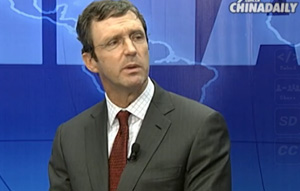Obama sets new date for Asia visit
Updated: 2013-11-22 02:07
By ZHAO YANRONG in Beijing and CHEN JIA in San Francisco (China Daily)
|
||||||||
Objective seen as rebalancing of 'pivot' to contain emerging China
US President Barack Obama will visit Asia in April after canceling a trip in October during the partial US government shutdown that raised questions about the US "Asia pivot" strategy.
National Security Adviser Susan Rice made the announcement in a speech on the US future in Asia at Georgetown University in Washington on Wednesday.
She said Obama will make the trip as part of his commitment to a larger US role in the Asia-Pacific.
"Our friends in Asia deserve and will continue to get our highest level attention. No matter how many hotspots emerge elsewhere, we will continue to deepen our enduring commitment to this critical region.
"Our commitment won't expire a few months or a few years from now. The United States will be there — reliable, constant, strong and steady — for the long haul," she said.
Rebalancing in Asia is a long-term strategy for the US that will bring opportunities and challenges for China, experts said.
Compared with Obama's first term, when he rolled out the "Asia pivot" strategy, Washington has focused on Syria's civil war and easing hostility with Iran in his second term, experts said, as well as confronting its debt after two wars and an economic recession.
The Obama administration needs to make some adjustments to the pivot, but the strategy will be carried forward for a long time, said Yuan Zheng, a researcher with the Chinese Academy of Social Sciences.
"A rising China is one excuse for the US to ‘pivot to Asia', but it is not necessary to make China the sole focus of the strategy," Yuan said. To keep its leading position in the world, the US would adjust to anyone who is considered a challenge, he added.
He said economic self-interest is a core reason for US rebalancing in Asia.
"Since the global economic recession, the Asia-Pacific market, especially the emerging economies, has been the hope for the US to boost its recovery. For instance, the US is dependent on the region to achieve its goal of doubling exports within five years," Yuan said.
Meanwhile, some countries around China also expect to see a greater US presence aimed at containing a rising China, which they view as a potential threat despite they having taken advantage of China's development to improve their own economies, Yuan said.
Obama's trip cancellation in October disappointed these countries, and his visit in April will not only enhance its "pivot to Asia" strategy but also make the Asian countries — especially those who are already US allies — more confident about their relations, Yuan added.
Pact questions
Rice said the US would also pursue the Trans-Pacific Partnership, a trade pact that Obama hopes will shape the coming order in Asia.
She reached out to China, which in the past has called the trade pact an effort to encircle the country. The pact is also unpopular with some other Asian countries.
"We welcome any nation that is willing to live up to the high standards of this agreement to join and share the benefits of TPP — and that includes China," Rice said.
However, Wang Jisi, head of the International Studies College of Peking University, said Beijing still lacks a full understanding of the TPP, since much of the substance of the agreement has not been studied.
Meanwhile, The US-China Economic and Security Review Commission on Wednesday called on the US Congress to fund shipbuilding and increase the navy's operational presence in support of the Defense Department's goal to base 60 percent of its warships in the Asia-Pacific region by 2020, compared with about 50 percent currently, to offset China's growing influence.
Foreign Ministry spokesman Hong Lei on Thursday said China always takes a non-aggressive stance on national defense and sticks to the road of peaceful development. The development of China's national defense is proportionate and safeguards the country, Hong said.
"This particular agency has, for years, published biased reports, stuffed with the ideology of the Cold War. Their perspective is not worth rebuttal," Hong said.
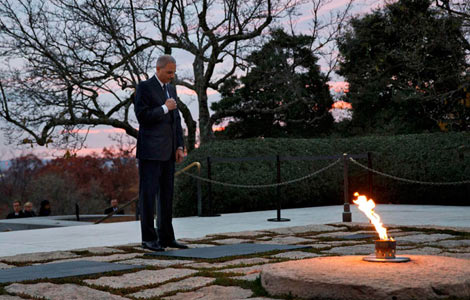
 US marks the 50th anniversary of JFK's assassination
US marks the 50th anniversary of JFK's assassination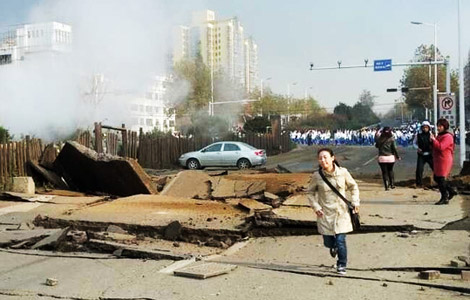
 Oil pipeline blast leaves 22 dead in E China
Oil pipeline blast leaves 22 dead in E China
 Good couples get better
Good couples get better
 More than 9m Syrians need humanitarian aid
More than 9m Syrians need humanitarian aid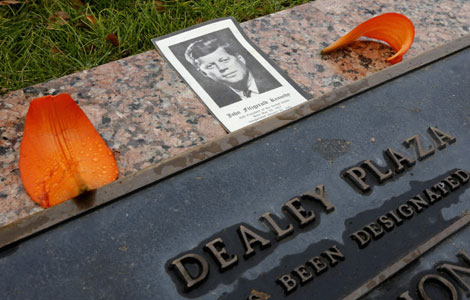
 50th anniversary of the assassination of Kennedy
50th anniversary of the assassination of Kennedy Blueprint tightens EU links
Blueprint tightens EU links
 Beckham promotes bodywear in Shanghai
Beckham promotes bodywear in Shanghai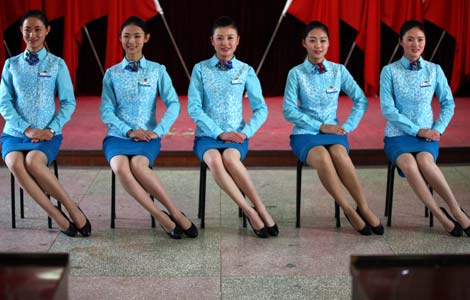
 Service seminar for E China train attendants
Service seminar for E China train attendants
Most Viewed
Editor's Picks

|

|

|

|

|

|
Today's Top News
Newtown investigation report to be released Monday
Wang named Asia's businessman of the year
Bitcoin rollercoaster hits China
US President sets new date for Asia visit
Bid to boost people ties
Manufacturing PMI seen moderating in Nov
Kennedy cousin Skakel poised for prison release
'Tapering' of QE would benefit world
US Weekly

|

|
